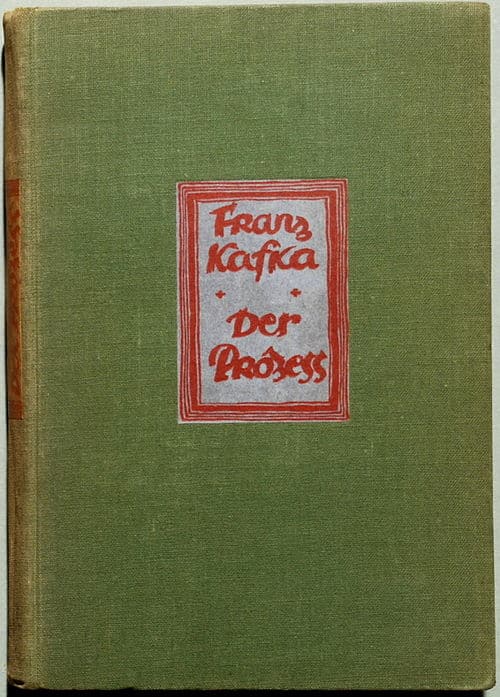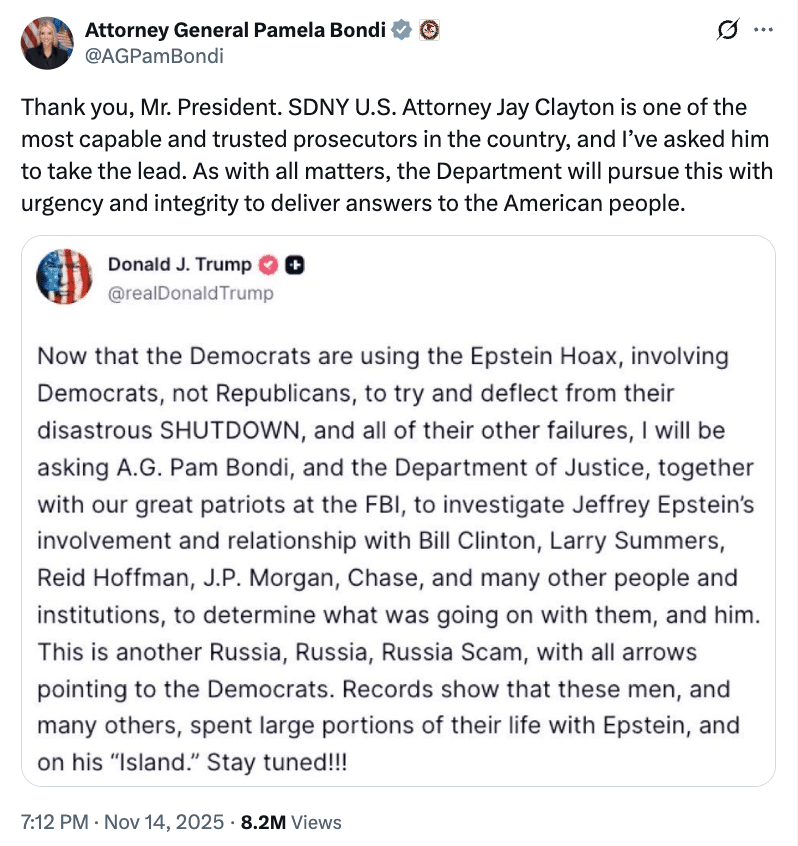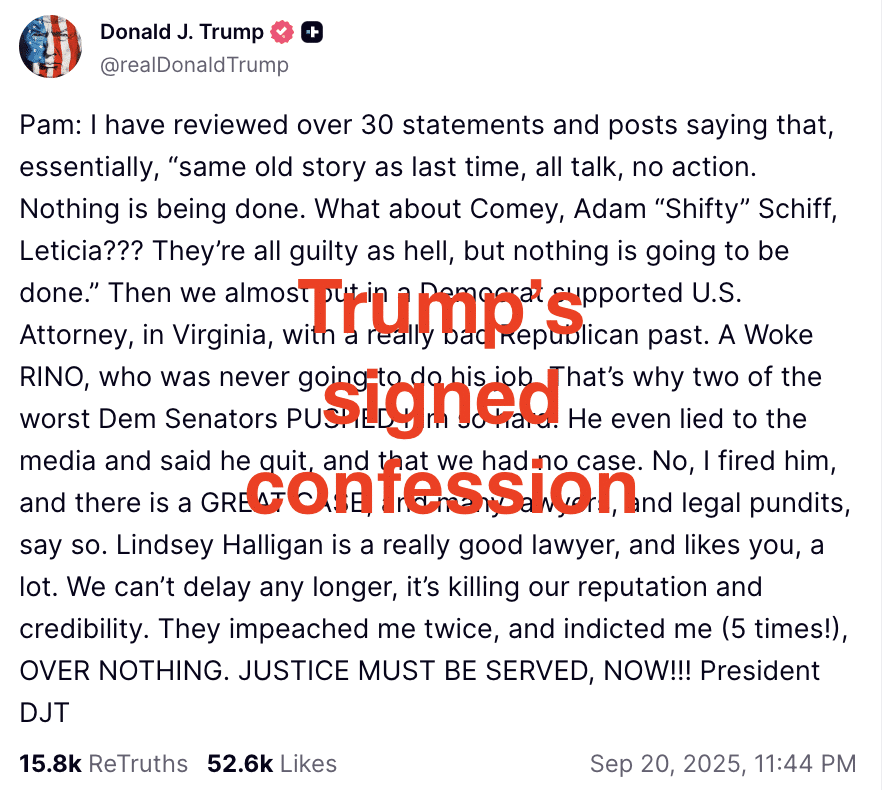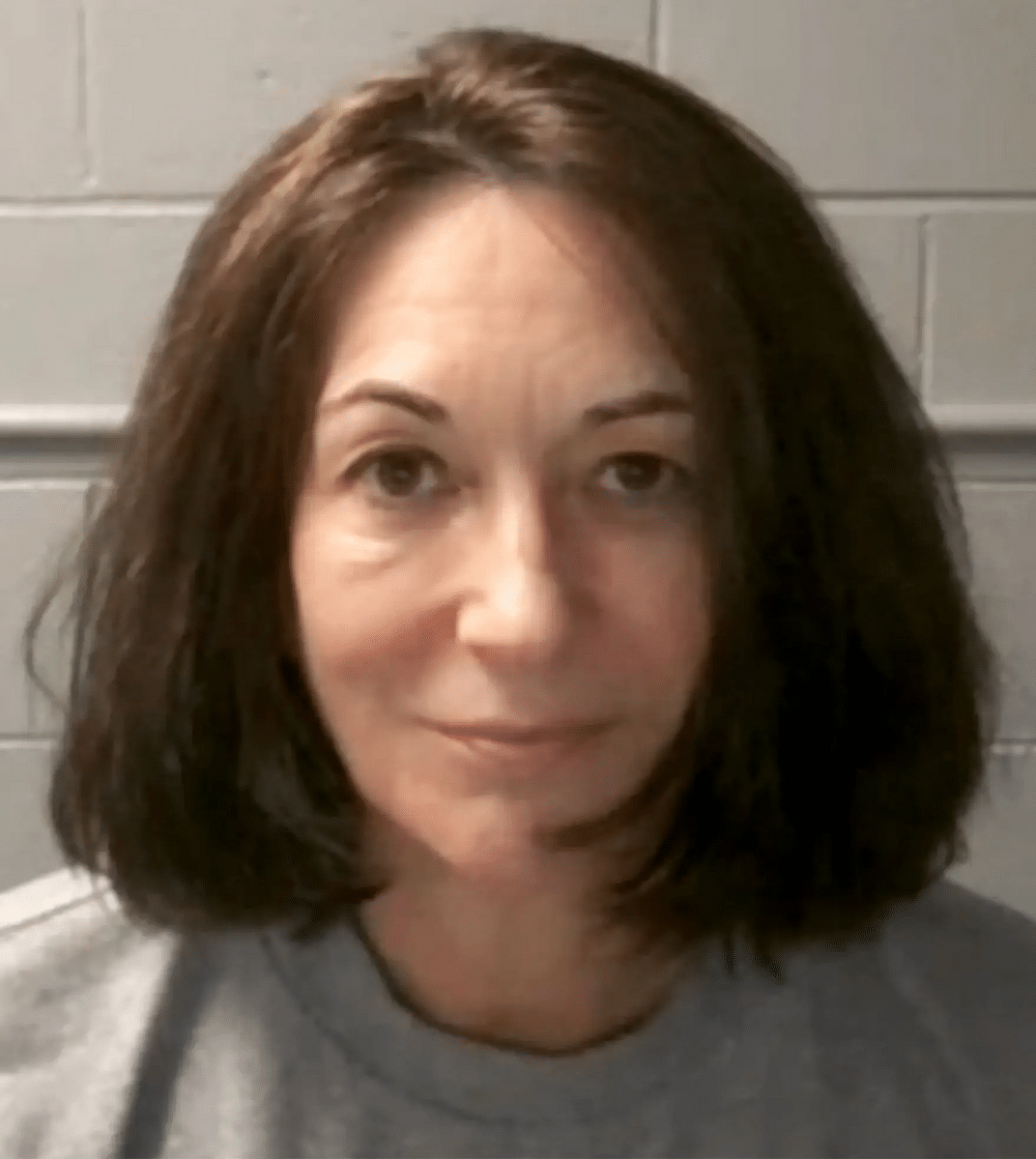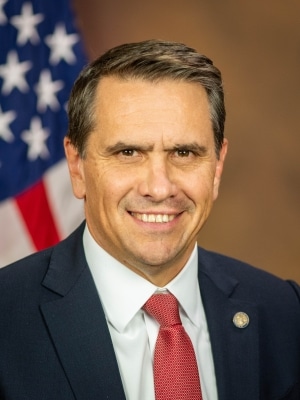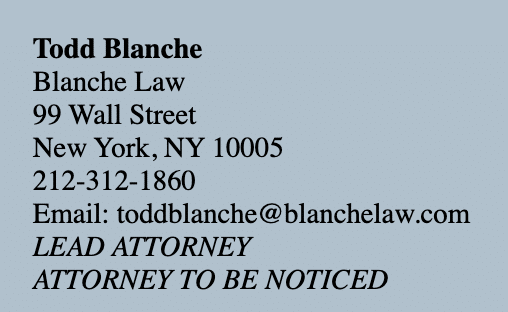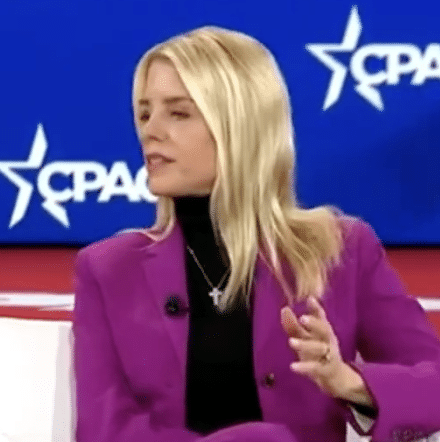The Kafka Story Inside Trump’s Godfather Trilogy
I’ve written several times (one, two, three) about the possibility that Maurene Comey’s wrongful termination lawsuit might provide transparency on DOJ’s larger weaponization against people like her father.
But (aside from vindication for Ms. Comey), I always conceived it in terms of the specific disclosures it might bring. Because she claims she was fired because of Trump’s gripes about her father, if the lawsuit survives motion to dismiss, Ms. Comey might well get more details of how Trump installed his Insurance Lawyer just in time to try to prosecute her father. (Indeed, Judge Jesse Furman, who presides over this case, suggested in an order he might grant Ms. Comey discovery before the motion to dismiss.)
A filing submitted in advance of a hearing scheduled for tomorrow reveals it may be more than that.
As part of a discussion in defense of suing now, before Merit Systems Protection Board adjudicates her case, Ms. Comey revealed a lot of what has been going on at MSPB, which normally would review Civil Service violations like her firing.
It starts by arguing that MSPB cannot adjudicate novel legal issues, such as whether the President can unilaterally ignore the Civil Service Reform Act.
[T]he MSPB lacks expertise to adjudicate this novel dispute: whether, as the government will likely argue, Article II of the Constitution overrides a federal employee’s rights under the Civil Service Reform Act (“CSRA”) and the Bill of Rights. See, e.g., Jackler v. DOJ, MSPB DA-0752-25-0330-I-1, DOJ submission, available at: https://washingtonlitigationgroup.org/wp-content/uploads/2025/09/Jackler-Motion.pdf. Because this case raises foundational constitutional questions with respect to the separation of powers, the MSPB is not the appropriate forum for this dispute. See Axon Enterprise Inc. v. Federal Trade Commission, 598 U.S. 175, 195-96 (2023) (district court retains jurisdiction over “collateral” claims “outside the [agency’s] sphere of expertise”); Thunder Basin Coal Co. v. Reich, 510 U.S. 200, 212, 214-215 (1994) (claims not of type Congress intended to be reviewed within statutory structure if “wholly collateral” to statute’s review provisions and “agency expertise” not “brought to bear on the statutory questions presented”) (cleaned up).
Then, it notes that all the legal precedents requiring people with termination complaints to first go through MSPB process are predicated on the MSPB being independent of the President.
Second, the Supreme Court decisions that outline the MSPB’s jurisdiction presumed an MSPB that functioned independently of the President, which is no longer true. The “CSRA’s adjudicatory scheme was predicated on the existence of a functioning and independent MSPB,” See Nat’l Ass’n of Immigr. Judges v. Owen, 139 F.4th 293, 304 (4th Cir. 2025) (rejecting channeling to MSPB because “Congress enacted the CSRA on the bedrock principle that the members of the MSPB and the Special Counsel would be protected from removal on political grounds, providing them independence from the President”). However, the President has pronounced that independent agencies must follow his interpretation of the law. See Exec. Order 14215 (Feb. 18, 2025) §§ 1, 2(b), 5, 7 (directing that the President and the Attorney General “shall provide authoritative interpretations of law for the executive branch,” and their “opinions on questions of law are controlling on all employees”—including on “so-called independent agencies”; “No employee of the executive branch… may advance an interpretation of the law… that contravenes the President or the Attorney General’s opinion on a matter of law”).2 Further, the President terminated the sole Democratic member of the MSPB Board and insists he has the unlimited right to do so,
Then, it noted that in the days after Ms. Comey wrote this in her complaint (Ms. Comey is represented by Margaret Donovan, who is handling several other Article II and other politicized firings) …
As of September 1, 2025, 891 PFRs are pending.47 Finally, on information and belief, in recent cases, the Government itself has argued before the MSPB that the CSRA is unconstitutional because it violates the President’s alleged Article II prerogatives, and that the MSPB has no jurisdiction over a challenge to an Article II removal. The MSPB, for its part, has previously ruled that it does not have the authority to adjudicate the constitutionality of statutes. 48 On information and belief, the MSPB is currently treating agencies’ Article II-based challenges to its authority consistent with this precedent, which is to say, it is declining to rule on the issue.
… The Office of Legal Counsel all of a sudden decided that the MSPB, and not Article III courts, should decide constitutional matters.
Indeed, the MSPB itself has repeatedly concluded that it lacks authority to adjudicate such sweeping constitutional questions, see Malone v. DOJ, 14 M.S.P.R. 403, 406 (1983), and until two months ago, so did the government, as discussed below, see Dkt. 1 ¶ 84.
[snip]
[A]nd the Department of Justice recently and suddenly reversed its position and now insists that the MSPB must review constitutional issues, compare Department of Justice, Office of Legal Counsel, Slip Opinion, 49 Op. O.L.C. __ (Sept. 26, 2025), to, e.g., Dkt. 1 ¶ 84 (alleging that the government argued, before September 15, 2025, that MSPB has no jurisdiction over a challenge to an Article II removal). The OLC’s reversal came immediately after an MSPB administrative judge declined to rule on the constitutionality of Article II removals; that issue is now on appeal to the very Board that the President has ordered must adhere to his interpretation of law. This is a thorough evisceration of the MSPB’s independence. As a matter of due process and constitutional principle, the President’s decision to remove a career civil servant without cause, in violation of Congress’s explicit prohibition, cannot fairly be adjudicated by an agency that is subservient to that same President.
Then it reveals that MSPB has been dismissing cases, like hers, challenging her firing on Article II authority until it decides whether the President’s Article II authority can override civil service protections, which is where Kafka gets invoked.
Third, any MSPB proceeding would be futile. On November 25, 2025, an MSPB administrative judge notified Ms. Comey that the MSPB intends to dismiss her appeal without prejudice, while awaiting a ruling from the Board (now beholden to the President) about whether the President’s Article II power overrides the CSRA. Today, the government consented to that dismissal. To the best of our knowledge, Ms. Comey is not alone. Since November 17, 2025, MSPB administrative judges have dismissed without prejudice multiple MSPB appeals of “Article II” firings, and the government has acquiesced in each case. See, e.g., Law360, “Ex-US Trustee Director’s Firing Appeal Tossed, For Now,” November 21, 2025 (citing Tara Twomey v. DOJ, MSPB DC-0752-25-1950-I-1). This procedure is Kafkaesque: the Executive Branch maintains it can fire Ms. Comey without the due process afforded by the CSRA, yet insists that she submit adjudication of that question to the body created by the CSRA, all while advocating for the premature termination of the CSRA process. Meanwhile, the Executive Branch contends it can dictate the outcome of her appeal (should it eventually proceed) by controlling the “authoritative interpretations of the law” and removing any decisionmaker who dares to disagree. This scheme has been transformed into a dead end that provides no due process. See Carr v. Saul, 593 U.S. 83, 93 (2021) (“It makes little sense to require litigants to present claims to adjudicators who are powerless to grant the relief requested.”). It is not what Congress intended. See Axon Enterprise, 598 U.S. at 191 (plaintiffs need not submit to administrative process where they would face “an illegitmate proceeding, led by an illegitmate decisionmaker,” because “being subjected to such an illegitmate proceeding causes legal injury” that “cannot be undone”); Thunder Basin, 510 U.S. at 212 (Congress did not intend to preclude district court jurisdiction where statutory scheme “forecloses all meaningful judicial review”). [my emphasis]
Thus far, Ms. Comey has not mentioned that John Sarcone, the only one willing to defend against this lawsuit, is playacting at being US Attorney just like Lindsey Halligan is or was.
Just to add to the abuse of power going on here.
It all sounds like the kind of case that could be headed for SCOTUS.
For now, Ms. Comey has more modest goals, like figuring out whether the President personally fired her, or whether some flunky (or former Defense Attorney) at DOJ did it for him.
First, initial discovery can be narrowly tailored, if necessary, to critical questions relating to the circumstances of Ms. Comey’s termination, including who made the decision and on what basis.
[snip]
For example, if the President terminated Ms. Comey, then the question before the Court is whether the President’s Article II powers supersede Congress’s Article I powers and the Bill of Rights. On the other hand, if, as the White House claims (Dkt. 1 ¶ 51), someone within the Department of Justice terminated Ms. Comey, then the Court must decide the additional question of the extent to which the President can delegate his alleged Article II power to supersede Article I.
Of course, even that detail may intertwine with her father’s potentially ongoing persecution.

